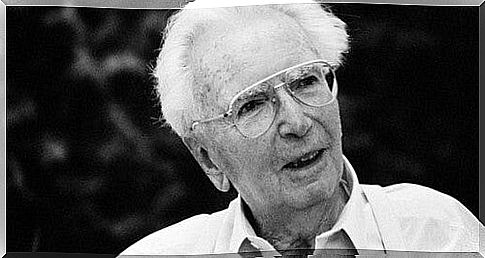Viktor Frankl’s Teachings On Resilience

These days Viktor Frankl’s teachings on resilience are more useful than ever. The famous psychiatrist said that during his confinement in concentration camps he used to make a mental effort: he imagined himself, in the not so distant future, while giving a lecture in front of a large audience to whom he explained how to manage the trauma Of the war.
This effort was of great help to him, as it allowed him to create for himself an inner refuge in which to keep alive his hope, his psychological strength. He set a target on the horizon and made this target an anchor to hold on to.
He managed to make sense of what did not have it; he wanted the terror and suffering he experienced to have meaning in his life : learning and then teaching other people to endure emotional pain.
Viktor Frankl’s teachings and his psychotherapeutic method never go out of style. Thus, although he did not speak of resilience as such (but rather of resistance), we can take his teachings as a substrate from which to better understand this concept.

Viktor Frankl’s teachings on resilience, a legacy to reflect on
The concept of resilience has its roots in the world of physics and engineering. It is the property of certain materials to recover their original state after having suffered an impact or interference (it could be compared to the elasticity of rubbers). The field of psychology borrowed this term to apply it to its studies as early as the 1940s.
It was Norman Garmezy, professor emeritus of the University of Minnesota, in the city of Minneapolis, one of the first to use this metaphor borrowed from a real physical phenomenon.
During his research studies on the world of schizophrenia he discovered an interesting aspect: the children of patients generally did not inherit the disease. In addition, they used to display rather resilient personalities, skilled and prone to great personal growth. The experiences lived at home shaped what Garmezy called a “resilient personality”.
On the other hand, and analyzing the same era, the former president of the Boston Psychoanalytic Society and Institute Maurice Vanderpol noted that a good part of the survivors of German concentration camps had this same characteristic. Viktor Frankl me was an example.
The same therapeutic approach he formulated and applied to patients was intended to help people give a new meaning to their lives, to shape a personality that was more resilient, with which to find a purpose to move forward.
Accept the reality
It’s always a good time to remember Viktor Frankl’s teachings on resilience. Thus, one aspect that we will be able to grasp by reading his studies and his lectures is that nothing is as decisive as accepting the reality that we have to live. Most of the time we can’t control what happens. The obstacle often has a chaotic component that overcomes us.
In such a context, only acceptance is included. There is no point in obsessing over the “why”, we have to focus on the “how and for what purpose”. What can I do to meet the challenge? What can I learn from this experience?

Look for a proper meaning
In his lyrics, Viktor Frankl relates that life in the concentration camp came down to wondering if it would be possible to swap a cigarette for a plate of soup. But even if that sadistic supervisor he had to work with from time to time would kill him today or the next.
In the midst of this scenario of continuing anguish, where meaninglessness and horror were a constant, he decided to look for a way to find the strength to survive.
He decided he wanted to make sense of everything he saw, felt and suffered. He learned a lesson from everything, he told himself, and one day he could use it to help other people overcome their traumas. This was his purpose and what helped him survive.
In the face of a difficulty, therefore, this should be our strategy. Be clear about our goals and fight for them. Thus, as Frankl himself explains, “ once we find meaning in life, we not only feel a little better, but we also find the courage to fight against suffering”.
Viktor Frankl’s teachings on resilience: mindset and transformation
Our attitude to life and difficulties determine, according to Frankl, our ability to cope with almost anything. It is in our hands to choose the right attitude: to give up, keep hope and trust that our past does not have to determine our future.
Attitude and the ability to transform ourselves to handle adversity are part of the legacy left to us by Viktor Frankl’s teachings on resilience. As he himself explained, it is not the context or the circumstances that determine who we are. but rather our decisions and thoughts. Let’s take care of it.
We encourage you to keep these ideas in mind and try to apply these lessons from the father of speech therapy to your own lives as much as possible.









